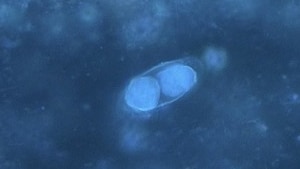Key points
- Cystoisosporiasis is an intestinal infection caused by microscopic parasite Cystoisospora belli.
- This parasite used to be called Isospora belli.
- It is usually spread when people consume contaminated food or water.
- It is most common in tropical and subtropical areas.

Overview
Cystoisosporiasis is an intestinal disease caused by the microscopic parasite Cystoisospora belli. This is the same parasite that used to be called Isospora belli. The parasite can be spread by ingesting food or water that was contaminated with feces (stool) from an infected person.
Symptoms
The most common symptom is watery diarrhea. Other symptoms can include abdominal pain, cramps, loss of appetite, nausea, vomiting, and fever. If untreated, people with weak immune systems, such as people with AIDS, may be at higher risk for severe or prolonged illness.
How it spreads
People become infected by swallowing mature parasites, for example, by ingesting contaminated food or water. However, oral-anal contact with an infected person might pose a risk for transmission. Infected people shed the immature form of the parasite in their feces. The parasite usually needs about 1 or 2 days in the environment (outside of people) to mature enough to infect someone else. In some settings, the parasite might mature in less than a day.
Resource
Prevention
Avoiding food or water that might be contaminated with stool may help prevent infection. As always, good handwashing and personal-hygiene practices should be followed. Wash your hands with soap and warm water after using the toilet, changing diapers, and before handling food. Teach children the importance of washing hands to prevent infection.
